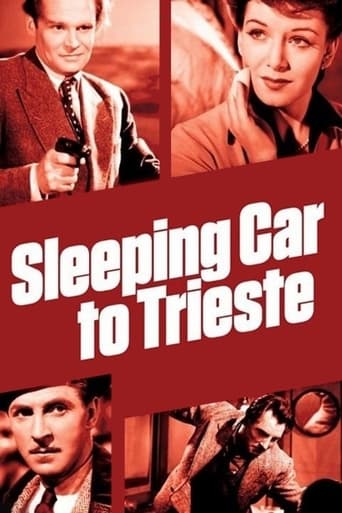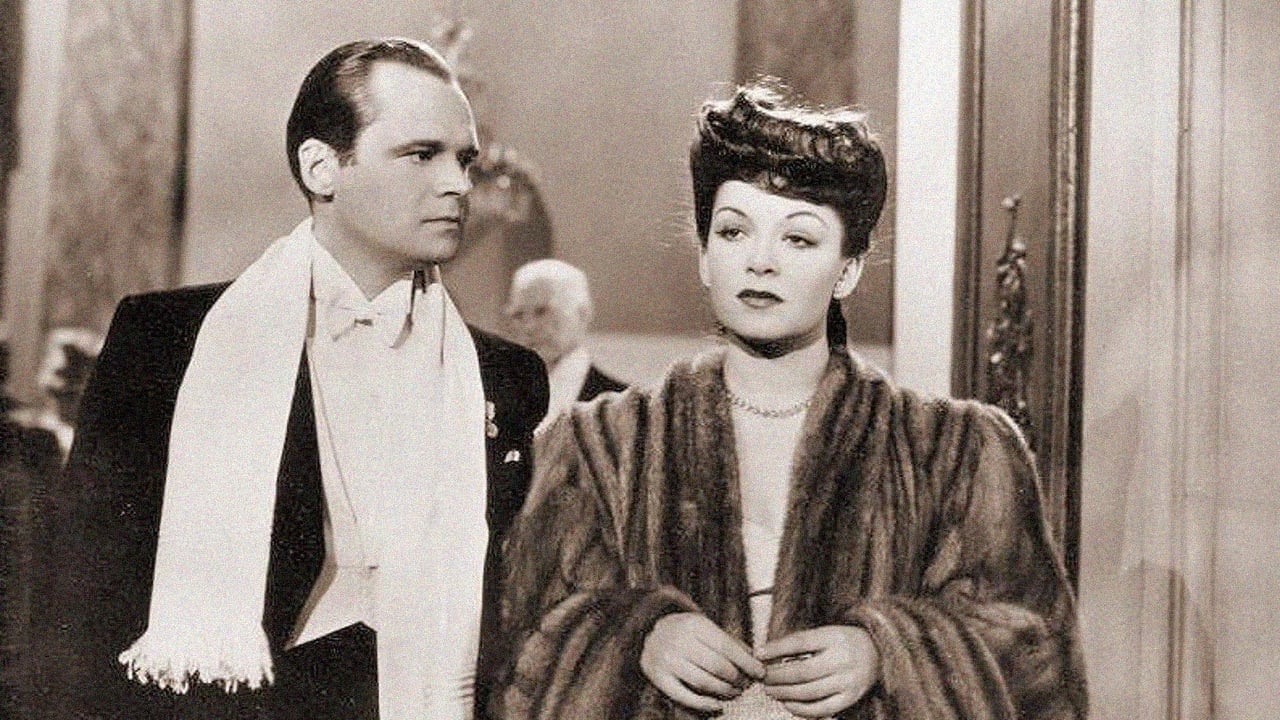writers_reign
Some films are celebrated for turning up under other titles in several decades; for instance The Most Dangerous Game resurfaced as - amongst others - The Hounds Of Zaroff and Run For The Sun and in Sleeping Car To Trieste we have another take on Rome Express and Stamboul Train. In Rome Express the item stolen from Paris was a valuable painting, this time around it is a diary that, in the wrong hands could result in war. In both cases of course it's merely an excuse for the pursuers to encounter a Hollywood bomber crew on board the train. In this case Jean Kent and Albert Lieven, in pursuit of Alan Wheatley, encounter the likes of David Tomlinson Derick de Marney, Finlay Currie, Hugh Burden, Bonar Colleano just for openers. It's a pleasant enough time-waster if you have nothing better to do.
mark.waltz
The theft of a lethal diary which could create scandal and possible war leads to intrigue amongst the rather shady passengers on the Orient Express they are all traveling upon. This isn't a collection of nice people, as the thief killed a valet during the theft, another government agent is determined to get his hands on it, and other assorted amoral people become involved through their own schemes and the close proximity to the people after the hidden diary, which results in murder. The poor American soldier on leave gets taken in by a French girl wanting to avoid customs charges, and after having been bored by the British expert on birds, you can see why he was taken in so easily. Another passenger is an obvious ruthless businessman whose assistant briefly gets his hands on the diary with nefarious plans of his own.This remake of a classic (and rare) earlier British film ("Rome Express") is updated neatly to Post War Europe and features a cast of mostly obscure British actors amongst its large ensemble. Most familiar to American audiences is future Disney star David Tomlinson during his years as a character actor in both comedic and dramatic roles. Excellent photography aids in the tension of the film which builds to a frightening climax.
howardmorley
This is a rattling good post-war thriller.It features customs duty evasion, adultery, espionage, murder, robbery in fact the screen writers attempted to include almost all the major crimes in their script (apart from sex crimes which were denied by the prevailing film code on film producers).The film is mainly played out on the romantic "Orient Express" with an international cast as it journeys from Paris-Simplon-Venice-Trieste across the Continent of Western Europe.Trains are a favourite location for thriller writers and several famous films were made with them as a backdrop: "The 39 Steps" (1935), "The Lady Vanishes" (1938), and "Night Train to Munich" (1940) all of which I can recommend to 1940s film buffs.I have quite a few films from the 1940s, my favourite era.If fans want to see the principal players from "Sleeping Car to Trieste" cast in leading roles, they should attempt to obtain the following films: Derrick de Marney - George Grant, a younger actor in Hitchcock's "Young & Innocent" (1937), Jean Kent - Valya, still playing rather sadistic roles in "The Browning Version" (1951), Albert Lieven - Zarta, more sympathetic as a portrait painter in "The Seventh Veil" (1945), Paul Depuis - Det.Insp. Jolif, a French Aristocrat in "Madness of the Heart" (1949) & "Passport to Pimlico" (1949), Bonar Colleano - Sgt. West, virtually playing the same role in "The Way to the Stars" (1945), Finalay Currie - Alistair MacBain, such a versatile actor, try the convict in "Great Expectations" (1946) with John Mills, David Tomlinson - Tom Bishop, his best role was as one of the "Three Men in a Boat" (1953).Finally, Alan Wheatley is indelibly imprinted on my memory as the dastardly Sheriff of Nottingham in the 1950s British TV series "The Adventures of Robin Hood" starring Richard Green.The plot without spoilers has already been indicated by other reviewers so I will restrict my comments on the acting.In the main it was very creditable and it has an interesting mix of international stars.The action never lets up but with the 1940s moral code in place, you know the guilty must eventually receive their comeuppance.In todays politically correct climate I am always fascinated by how often actors in these 1940s films light up and drink copious quantities of Scotch.It makes a refreshing change and reminds me of my youth when steam was the norm on railways.I rated it 6/10.P.S. I was born in 1946.
mchlwilson
As an American, I am always interested to see how Americans are portrayed in European films, particularly films made prior to WWII and in the years immediately following it.The American in this film is portrayed as a vulgar contrast to the more sophisticated Europeans on board the train. He is a boozing, whistling, skirt-chasing Italian-American GI with a New York accent. (Why are they always from New York?) He is contrasted with the British passengers in two notable ways: First, his passion for the fairer sex is more overt and he comes across as wolfish in his pursuit of the young women in the film. This is contrasted with the discrete way in which the adulterous British couple on board the train are conducting their affair. When the two young French woman spurn his attempts to have a drinking party with them in their sleeping compartment, one says to him "We no longer wish to be liberated!" or words to that effect. This is a revealing statement about how the American military presence in postwar Europe was wearing thin the patience of Europeans.Second, the magazines this American GI reads are prominently displayed so as to ensure that the audience can see them. They are the standard popular American mediocrities of the day: Saturday Evening Post, Life Magazine, etc. This is contrasted with the more scholarly (albeit boring) readings of bird-watching Britisher sharing his compartment.Overall, the American in this film is the stereotypical boorish American so common in European films of this era. His portrayal, however, is not worse than Hollywood's stereotypes of Europeans.Please note that this is not a criticism, but rather an observation. Americans are not singled out for criticism; the film traffics in several stereotypes (the cheapness of Scotchmen, for example) and does so mainly in a vein of comedic irony. Even the British get their own send-ups in this film.


 AD
AD



